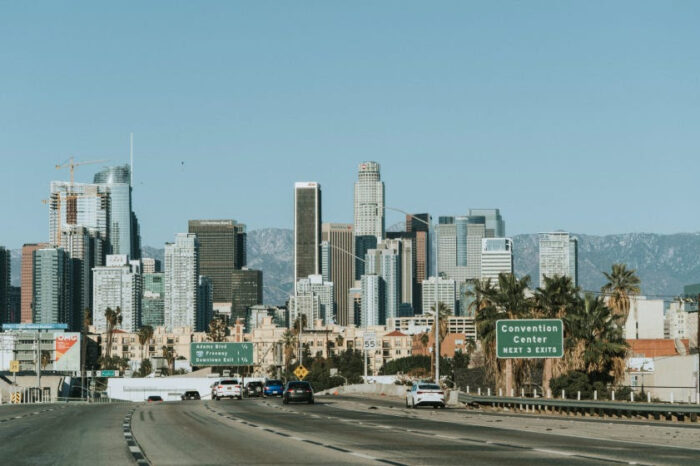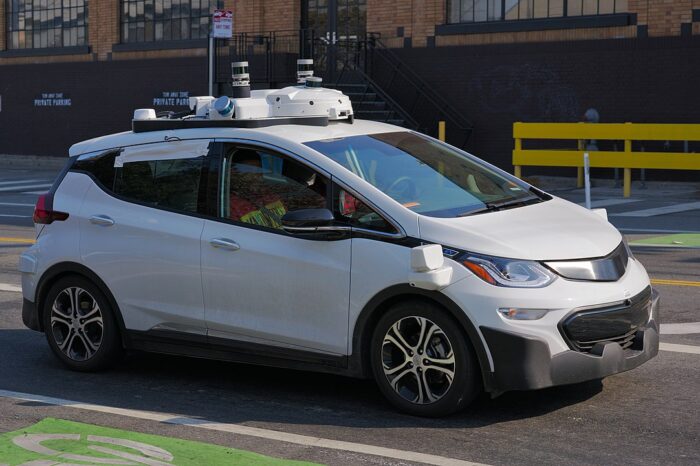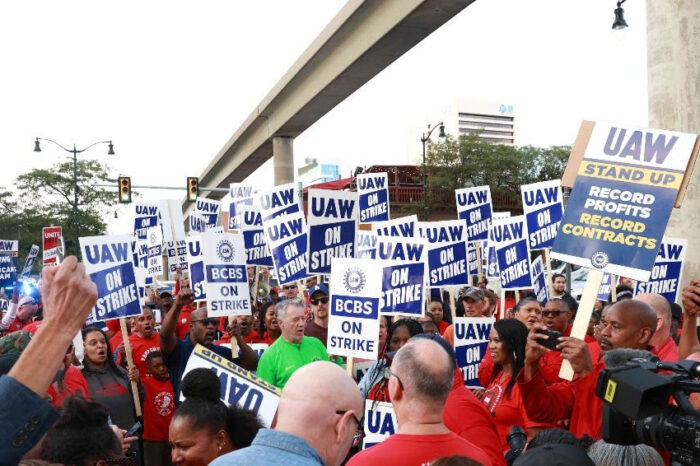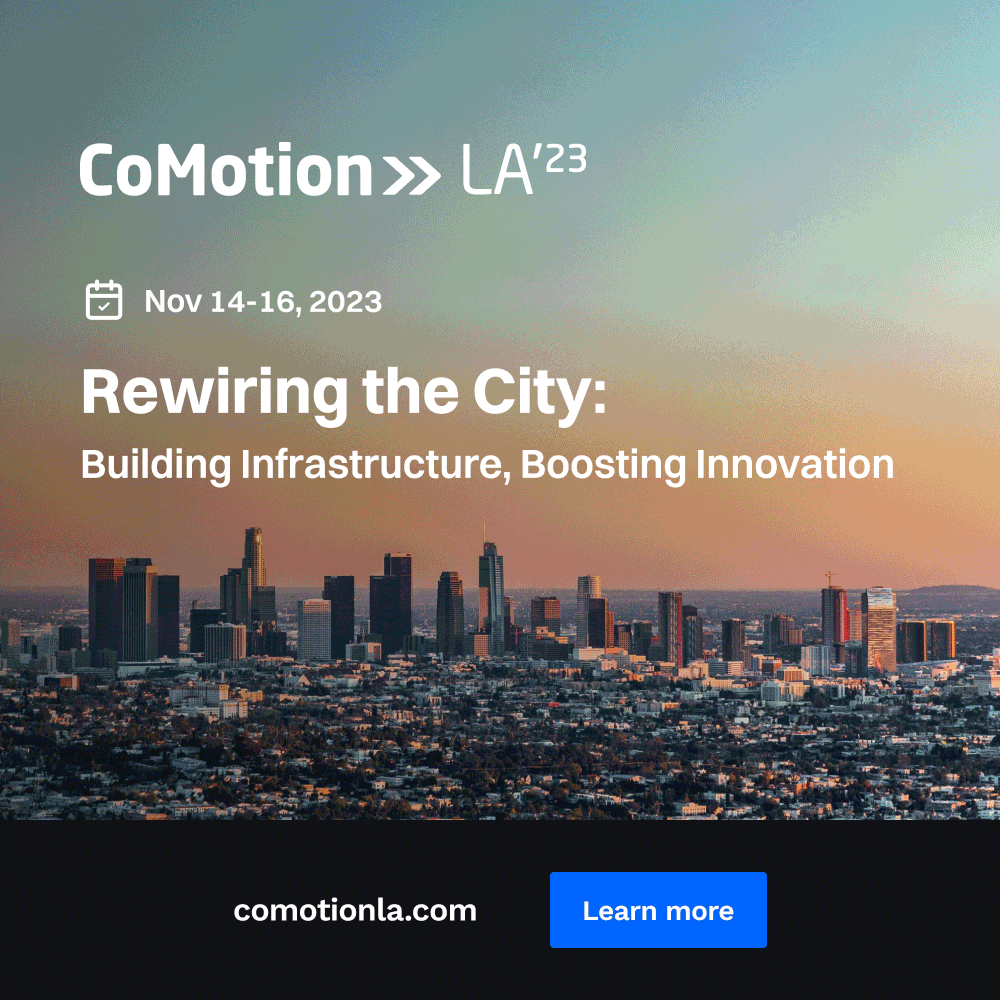Folks, we’re just over ONE week away from CoMotion MIAMI, May 10-11! Register today to get a pass: if you have a professional or personal interest in future mobility or urbanism, you won’t want to miss it!
Pity the Chevy Bolt. It has its best quarter yet and GM is still killing it off, much as it and other Detroit automakers killed off their gas-burning sedans in favor of SUVs and trucks. Americans bought two-thirds more EVs in Q1 than a year ago, and while most of them are still buying Teslas, Elon Musk’s company’s dominance is steadily slipping as other automakers start delivering EVs.
Speaking of the auto industry, why did the rise of car manufacturing doom public transit in America? And why did the opposite happen in Japan, another car manufacturing behemoth? Meanwhile, American cities trying to revive transit are having trouble due to big increases in the cost of, well, everything. Nevertheless, Colorado is on its way to making fare-free transit a summer tradition.
Also: Lisbon bans cars in the city center, a scary new study about the effect of pollution on heart health, Chinese EV maker BYD says fully driverless cars are not coming soon, California unveils a new e-bike incentive and the decline of U.S. airlines presents an opportunity for air taxis.
![]()
GM to ax the Chevy Bolt: Despite posting record sales of the Chevy Bolt last quarter, GM will halt production of the EV later this year, says CEO Mary Barra. Although Barra did not shut the door on future electric sedans, she said the Michigan plant currently producing Bolts will shift to making the new electric Chevy Silverado and GMC Sierra. This suggests that GM’s EV strategy will be similar to its ICE strategy: high-margin SUVs and trucks.
EV sales rise 66%: Americans purchased roughly 247,000 EVs in the first quarter of the year, accounting for 7% of total vehicle sales. That’s up about 66% –– or nearly 100,000 more vehicles –– from the same quarter last year. Although Tesla’s market share is declining, it still accounted for 65% of all EV sales. Nearly all of Tesla’s sales are for the Model Y (100,000) and the Model 3 (52,000), by far the best-selling EVs in the U.S. In distant third and fourth places were the Chevy Bolt (19,700) and the Volkswagen ID.4 (9,700).
BYD says full driverless ‘basically impossible’: In stark contrast to Elon Musk, the leaders of Chinese EV maker BYD apparently have little confidence that fully driverless vehicles will be viable in the near future –– or ever. “We think self-driving tech that’s fully separated from humans is very, very far away, and basically impossible,” a spokesman for the company told a Chinese publication.
Lisbon bans cars downtown: The Portuguese capital becomes the latest European city to restrict driving in the city center. So far, however, city leaders are not framing the change as permanent or in radical, paradigm-changing terms. Rather, they stress that the plan is subject to change and that, if nothing else, the city center needs a traffic break due to substantial construction, including a major metro line extension. However, if recent history offers any clues, once people get a taste of car-free roads, many don’t want to go back. Paris, Madrid, Barcelona and Amsterdam have also taken aggressive steps to get cars out of big portions of the city in recent years.
Mexico City could get air taxis: Redwings, a Mexican private jet operator, and Jaunt Air Mobility, a Dallas-based eVTOL startup, sign a letter of intent on a strategic collaboration for air taxis in urban markets, including Mexico City. The deal would commit Redwings to purchasing 10 of the zero-emission vehicles, which can go up to 120 miles at a time. This would obviously be an ultra-luxury transportation option for the Mexico City elite.
Texas passes $200 EV fee: The Texas Legislature passes a bill establishing an annual $200 fee for EV owners. The law’s backers say the measure is necessary because EVs aren’t paying the gas taxes that fund highway construction in the Lone Star State.
California’s new e-bike incentive: The Golden State will soon introduce a generous e-bike subsidy. Anybody with an income up to 300% of the federal poverty level –– $43,740 for a single person, $90,000 for a family of four –– is eligible for a $1,000 voucher; they can get an additional $750 for a cargo e-bike.
Colorado builds on free transit program: Transit will once again be free this summer in Colorado. Gov. Jared Polis signs a bill extending a pilot program created last year that offers funding to local transit agencies that provide fare-free transit during the high-ozone summer months. The program not only increased ridership, but the ridership increases appeared to endure even after fares went back into effect in September.
Airlines are cutting back: 324 U.S. airports have had service cuts in the past three years, losing an average of 30% of their flights. The result is that long-distance travel costs more time and money for many Americans, particularly those who don’t live near a major city.
Link between pollution and irregular heartbeats: A study of Chinese hospital admissions finds a significant increase in risk of arrhythmias in the hours following an increase in local air pollution levels.
…could eVTOL fill the gap? Kevin Cox, CEO of Ferrovial Vertiports, which builds infrastructure for electric vertical take-off vehicles, believes air taxis could play a first/last mile role for air travel, connecting air travelers to smaller cities that aren’t served by major airlines. However, inter-airline travel is only one of the uses he envisions for eVOTL, along with intra-urban and inter-urban travel.
Tesla suggests Musk‘s AV statements could be deep fakes: Arguing that Elon Musk should not have to be deposed by lawyers of the family of a man who died in a 2018 crash when his Tesla was on Autopilot, attorneys for Tesla say Musk cannot recall some of the statements he made in which he exaggerated Autopilot’s capabilities. Plus, they suggested, the remarks that have been attributed to him could be ‘deep fakes.’ A judge rejected that argument, ruling that Musk must submit to the interview.
![]()
How Tokyo became an anti-car paradise: Writing for Heat Map, Daniel Knowles describes the startling tranquility of Tokyo, arguably the world’s most pedestrian-friendly big city. Why so calm? Well, only 12% of private trips are made by car. This is not an accident, of course, but the result of generations of political decisions that, even in a country with a proud, powerful auto industry, focuses on moving people over moving cars.
Secretary Pete talks free transit, road deaths: In an interview with Vox’s Jonquilyn Hill, Transportation Secretary Pete Buttigieg ponders the pros and cons of fare-free transit and argues, “We should all be up in arms about roadway deaths in this country.” Yes, we should.
Rising costs are shrinking rail systems: Big increases in the cost of supplies, land and labor are forcing transit agencies across the U.S. to dial back ambitious plans for light rail. This can lead to a vicious cycle, where transit agencies fail to live up to expectations, thereby undermining support for further investment in transit from voters and the officials they elect.
What will New York do about housing? Gov. Kathy Hochul’s ambitious plan to force reluctant communities around the state to allow more housing fails to advance in the state legislature. The New York Times looks at what she could have done differently and what she might do differently to ensure success in the future.
The story of America’s transit decline: Transit pundit David Zipper interviews historian Nicholas Dagen Bloom about his new book, The Great American Transit Disaster, which chronicles the rise and fall of public transit in American cities. Among the many interesting facts highlighted in the book: the number of annual streetcar trips in the U.S. declined from 9 billion in 1947 to just 200 million by 1972.
Enjoy the Week in Review? Get it delivered directly to your inbox by signing up for the CoMotion>>NEWS newsletter.






